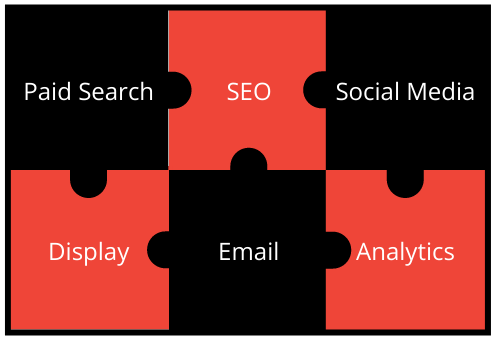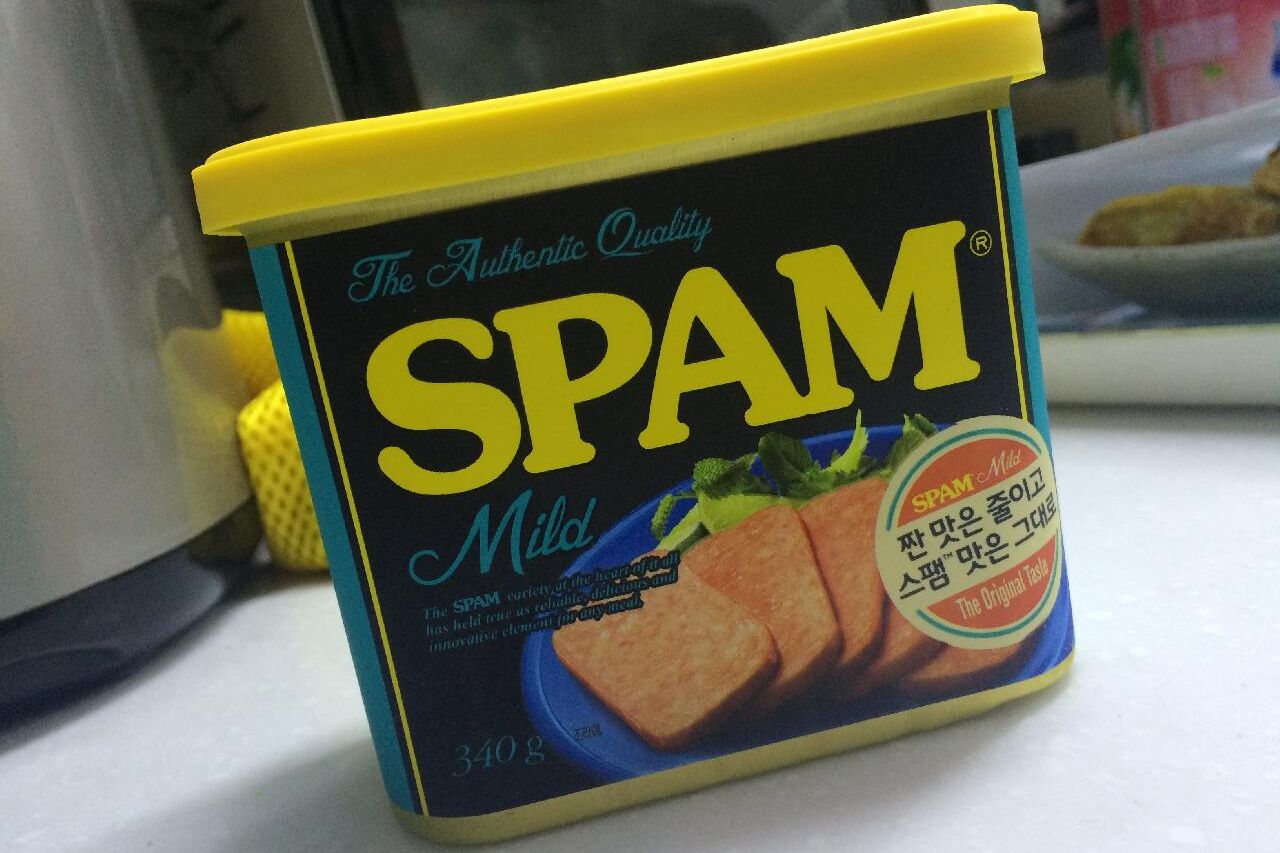The Digital Marketing Puzzle
All the Pieces You Need to Complete Your Digital Marketing Strategy
The way you market your business is as important as what product or service you're selling. Digital marketing has taken over the world and is constantly evolving. If your strategy doesn't evolve with it, then you will find your marketing may not be working as effectively as it did in the past.
A digital marketing strategy has many different pieces that create an effective digital marketing puzzle. Today we're going to focus on 6 key components of the digital marketing puzzle, sharing best practices, and giving you tips on how to get started. Plus we're going to touch on the most important part of your puzzle: the frame!
The 6 Puzzle Pieces:
#1 Paid Search
The first piece of the digital marketing puzzle is Paid Search. Paid search, also referred to as Search Engine Marketing (SEM), Paid Placement, or Pay Per Click (PPC), allows advertisers to pay to be listed within the Search Engine Results Pages(SERP) for specific keywords or phrases. It's most commonly associated with Google Ads and Facebook Ads.
Paid search campaigns are a really great way to get your products or services in front of your target audience when they are actively searching. They can also help you to create brand awareness and ultimately increase sales.
How to Get Started With Paid Search:
So where do you start? Before you start creating your own paid search campaign inside Google Ads or Facebook, it's really important to make sure you have a goal in mind. From there you should think about what campaign type is best for you. Next, you should make sure your website is ready for paid search ads and the traffic that comes with it. Then you should make sure you understand what makes up an ad and review some best practices for them.
#2 Search Engine Optimization (SEO)
The next piece is Search Engine Optimization or SEO for short. SEO is the process of optimizing the content on your website to ensure that you rank higher organically on the Search Engine Results Pages(SERP). This can also include continuing to create and publish new content such as blog posts or newsletters on your site.
SEO should always be a key part of creating your website's design. By focusing on messaging that relates back to your target keywords you can boost your organic rankings.
Search engine optimization is the process of strategically modifying elements such as content, code and design, in order to rank higher in search engines. Search engine optimization is a process where web developers make their website as easy as possible for search engines, like Google and Bing, to index.
How to Get Started With SEO:
The most important thing to remember about SEO is that the results don't happen overnight. Be patient with yourself and start with the ABC's of SEO. Additionally, it will take you time to learn how to write content that ranks well and learn how to optimize your blog posts for Google. You should also make sure that you familiarize yourself with the difference between black-hat and white-hat SEO. You'll want to be sure you're going about it right.
#3 Social Media
Social media is a fantastic free tool that any business can use to connect with its audience and build trust. Social media is a great way to promote your business and connect with customers.
Social Media is a good way for businesses to connect with their customers. For example, if you run a clothing store and have an Instagram account, you can post pictures of the clothes that your store sells. This will give people ideas as to what they can expect when they come to your store or go to work with your business.
How to Get Started With Social Media:
There's no doubt that social media can be a powerful marketing tool for small businesses. But with so many different platforms to choose from, it can be difficult to know where to start. Here are a few tips to help you get started with social media:
- Define your goals: What do you hope to achieve by using social media? Whether it's increasing brand awareness, generating leads, or driving sales, it's important to have a clear idea of what you want to accomplish.
- Research your audience: Which social media platforms are they using? What kind of content do they respond to? By understanding your target audience, you'll be able to create content that resonates with them and helps you achieve your goals.
- Choose the right platforms: Once you know who your target audience is and what you want to achieve, you can select the social media platform that makes the most sense for your business. There's no need to be on every platform; focus on the ones where you're most likely to reach your target audience.
- Create high-quality content: Your social media posts should be informative, interesting, and relevant to your audience. Steer clear of hard selling and promotional content.
#4 Display Advertising
Display advertising is a form of online advertising, which focuses on the promotion of a particular brand or product. This type of marketing uses banners, images and video to engage people and encourage them to take action. Display advertising is an effective way to reach your target audience. It can be used to promote a variety of products and services, but you need to keep in mind that content plays a key role when it comes to designing them.
How to Get Started With Display Advertising:
There are several ways to get started with display advertising. One of the easiest is through Google Ads, which allows you to run ads on targeted websites and in search results.
If you're new to the world of display advertising, it's important to understand what it is and how it works. This article gives instructions on setting up a campaign for your business.
#5 Email Marketing
Email marketing is one of the most powerful tools in a marketer's arsenal. Email marketing provides direct access to your audience, which means you can get an instant response from them. It also gives you the ability to segment your list and customize your message for each person on it. Customers are more likely to open emails than social media posts or texts, making email marketing a vital tool for marketers looking to reach their target audiences with personalized messages that will lead them down the conversion funnel. Here are some tips on how to make sure your email campaigns rock!
Email marketing is one of the best ways to market your business. The reason why I say that has to do with how it's a personal, low-cost way of reaching out to your customers and also offers flexibility for you as well as for them. The best practices for email marketing are to A/B test your subject lines, send regular newsletters with great content and show up in the inbox.
How to Get Started With Email Marketing:
Email marketing is a great way to promote your business. Start by building an email list, then write compelling content and have a call-to-action in every email you send.
- Create a catchy subject line: The first thing an email recipient sees when they open your message is what's written in the subject line so it needs to be attention-grabbing.
- Personalize your messages: Tailor each email that you send out by including the recipient's name in the greeting or mentioning something specific about them (their hometown).
- Include links within your emails: Make sure that there is at least one hyperlink included in every email that you send. This will allow readers who want more information to head over to your site and continue reading.
- Make sure your emails aren't spammy: Your audience receives a ton of emails every day you'll want to make sure they don't see yours as spam but as worthy good content.
Google Analytics is an important tool for any business. It helps you understand what people are doing on your website, and make data-driven decisions to help improve your business. To have an effective business, you need to know how it's doing. You can't make changes if you don't measure your performance and understand the data. Google Analytics is a powerful and free tool that lets you track all the statistics of your website.
How to Get Started With Analytics:
If you're looking to get started with analytics, here are the first steps you should take:
- Make sure you have Google Analytics setup and your tracking code is in place on each of your website's pages. This will allow you to track the number of visits to your site, where people are coming from, and what pages they visit on your site.
- Once you have this data, you can use it to measure goal success and track progress. For example, if your goal is to increase website traffic from organic search, you can use data from Google Analytics to track how many people are finding your site through organic search and which keywords they're using. This will help you to gauge the progress of your SEO efforts and make necessary adjustments along the way.
- By understanding how to get started with analytics, you can unlock a wealth of insights that will help you to improve your website and achieve your business goals.
Puzzle Frame: Your Website
There are a few key things you need to keep in mind when making sure your website is functioning properly to support your digital marketing efforts.
- Your website needs to have a good design. This includes both the look and feel of the site, as well as the user experience. Hiring a professional to design your site is always a good idea, especially if your goal is to make money from it.
- You need to make sure your site is easy to navigate and use. If potential customers can't find what they're looking for, they're not going to stick around.
- You need to make sure your site is updated regularly with fresh content. If you can do all of these things, you'll be well on your way to having a successful website that supports your digital marketing efforts.
How to Get Started With Your Website:
Deciding whether to design your website yourself or hire an agency is a big decision. If you have the time and skills required to build a site yourself, then doing it yourself may be the right choice for you. However, if you're not sure where to start or don't have the time to commit to building a site, then working with an agency may be a better option. Here are a few things to keep in mind when making your decision:
- Time: How much time do you have to dedicate to building a website? If you only have a few hours a week to work on it, then it may be better to hire an agency.
- Skills: Do you have the skills required to design and build a website? If you're not sure how to code or don't know much about design, then working with an agency can help ensure that your site looks professional and functions well.
- Budget: How much money are you willing to spend on your website? If you're on a tight budget, then doing it yourself may be the best option. However, if you're willing to invest in your site, then working with an agency can help you get a higher-quality website.
You may have heard the phrase "it takes a village." The same can be said of developing and managing an effective digital marketing strategy. With all of the different moving parts - website design and development, content creation, SEO, social media, PPC, email marketing, etc. — it can be difficult for businesses to keep up, let alone excel.
This is why partnering with a marketing agency that specializes in digital marketing can be so beneficial. An experienced agency will have a team of experts who are well-versed in all things digital marketing and can help your business develop and execute a strategy that gets results.
So if you're feeling overwhelmed by all the pieces of the digital marketing puzzle, know that you don't have to go it alone - there are partners out there who can help. Eternity happens to be one of those partners and if you want to start a conversation, please reach out to chat with us today!



